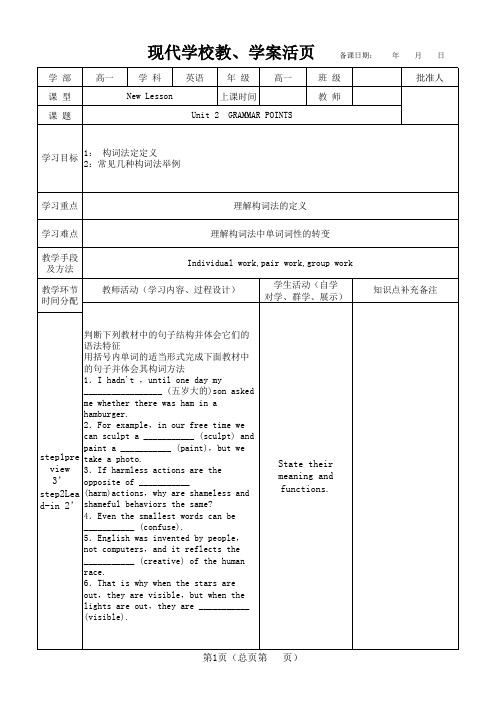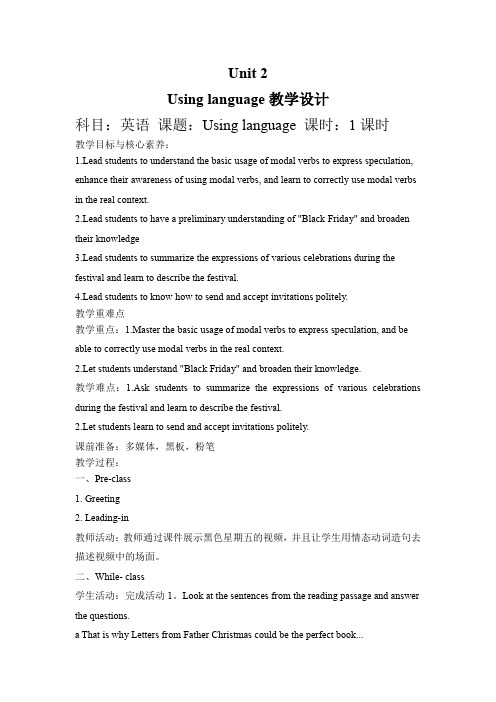Survival+Using+language+教学设计 高二上学期英语外研版(2019)选择性必修
Unit2Usinglanguage教案- 高中英语外研版(2019)必修第一册

【感知句子,生成双基】Self-study(10
’)
英语的构词法主要有三种:转化法、派生
法和合成法。
一、转化法
一个单词由一种词性转化为另一种或几种
词性。
转化词 例词
动词→名词 walk v.行走→walk n.散步
swim v.游泳→swim n.游泳
......
二、派生法
即在词根之前加前缀或在词根之后加后缀
it is not ________ (suit) for the
beginners.
2.Is English an ________(option)
lesson,or does everyone have to
learn it?
3.With so many people
________(focus) their eyes on him,he
学部 课型 课题
现代学校教、学案活页 备课日期: 年 月 日
高一
学科
英语
年级
高一
New Lesson
上课时间
Unit 2 GRAMMAR POINTS
班级 教师
批准人
学习目标
1: 构词法定定义 2:常见几种构词法举例
学习重点
学习难点
教学手段 及方法
教学环节 时间分配
理解构词法的定义 理解构词法中单词词性的转变
4.My parents have always encouraged
me in my choice of ________ (职业).
5.You shouldn't ________ (忽视) your
step4sho w+Group work20'
高二上学期英语备课综合:Book+5+Unit3+using+language+教学设计.doc

英语学科课时教学设计Have a good understanding of the text by skimming and scanning the passage.Ss can understand the passage and retell the passage.检查结果及修改意见:合格[ ] 不合格[ ]组长(签字):检查日期:年月日品味人生1、不管鸟的翅膀多么完美,如果不凭借空气,鸟就永远飞不到高空。
想象力是翅膀,客观实际是空气,只有两方面紧密结合,才能取得显着成绩。
2、想停下来深情地沉湎一番,怎奈行驶的船却没有铁锚;想回过头去重温旧梦,怎奈身后早已没有了归途。
因为时间的钟摆一刻也不曾停顿过,所以生命便赋予我们将在汹涌的大潮之中不停地颠簸。
3、真正痛苦的人,却在笑脸的背后,流着别人无法知道的眼泪,生活中我们笑得比谁都开心,可是当所有的人潮散去的时候,我们比谁都落寂。
4、温暖是飘飘洒洒的春雨;温暖是写在脸上的笑影;温暖是义无反顾的响应;温暖是一丝不苟的配合。
5、幸福,是一种人生的感悟,一种个人的体验。
也许,幸福是你风尘仆仆走进家门时亲切的笑脸;也许,幸福是你卧病床上百无聊赖时温馨的问候;也许,幸福是你屡遭挫折心灰意冷时劝慰的话语;也许,幸福是你历经艰辛获得成功时赞赏的掌声。
关键的是,你要有一副热爱生活的心肠,要有一个积极奋进的目标,要有一种矢志不渝的追求。
这样,你才能感受到幸福。
6、母爱是迷惘时苦口婆心的规劝;母爱是远行时一声殷切的叮咛;母爱是孤苦无助时慈祥的微笑。
7、淡淡素笺,浓浓墨韵,典雅的文字,浸染尘世情怀;悠悠岁月,袅袅茶香,别致的杯盏,盛满诗样芳华;云淡风轻,捧茗品文,灵动的音符,吟唱温馨暖语;春花秋月,红尘阡陌,放飞的思绪,漫过四季如歌。
读一段美文,品一盏香茗,听一曲琴音,拾一抹心情。
8、尘缘飞花,人去楼空,梦里花落为谁痛?顾眸流盼,几许痴缠。
把自己揉入了轮回里,忆起,在曾相逢的梦里;别离,在泪眼迷朦的花落间;心碎,在指尖的苍白中;淡落,在亘古的残梦中。
Unit 2 Using language (教案 )-高中英语外研版(2019)必修第一册

Students are in the first semester of Senior High school. After three years of junior high learning, they have mastered around 2,500 words, and know some basic knowledge about word formation. However, their vocabulary is no sufficient, and their knowledge in word formation is very preliminary. They know the differences in American English and British English, but most of them cannot give a full picture of the differences and may not know the reasons behind suchProcedures
Tasks students to briefly review thepassage
learned in last class and ask students9opinion on vocabulary learning.
T guides Ss to realize that we have rules to followwhen
learning English. Wecan
Invite students to review the past knowledge and realize
感知注意 记忆检索
In this part, Ss can quickly review the key points in last class and relate them to this class. Ss can gain confidence in vocabulary learning.
外研版高二英语选择性必修第二册(2019版)_Unit6_Using_language_板块教学设计

Teaching contents
Procedures
Purposes
Teacher’s activity
Students’activity
Activity 1
1.Teacherasks students to read the sentences in the first boxand payspecial attention to the words in bold. Then askstudents Questions 1–2.
6.Teacher checks answers with the whole class, and gives some explanations if necessary.
1.Studentsobserve the twogroups ofsentences inthe first boxand answerQuestions 1–2.
4.Teacher checkstheanswers.
1.Studentsread the story and get themain idea of it.
2.Students retell the story in their own words.
3.Students complete the sentences according to their meaningin the story.
Activity 3
1.Teacher asks students to readthe story and have a thorough understanding of it.
Improving+Yourself+Using+language+教学设计 高二上学期英语外研版

外研版(2019)选择性必修第二册Unit 2 Improving YourselfUsing language本节课的教材分析:本节课的教材是外研版(2019)选择性必修第二册Unit 2 Improving Yourself Using language。
该课程主要介绍了如何通过学习来提高自己,并着重讲解了四个方面的学习方法:1. 全身心投入;2. 注重理解;3. 多读多练;4. 合理安排时间。
教学目标:1. 知识与能力目标:掌握通过四个方面的学习方法来提高自己的基本能力;2. 过程与方法目标:培养学生主动学习、积极思考和团队合作的能力;3. 情感态度与价值观目标:培养学生良好的学习习惯和积极进取的学习态度。
教学重点:掌握如何通过全身心投入、注重理解、多读多练和合理安排时间等学习方法来提高自己。
教学难点:培养学生主动学习和积极思考的能力。
学情分析:学生是高二年级的学生,他们具备一定的英语基础,但也面临着升学压力和学习方法不多样化的问题。
学生对于如何提高自己的学习效果和方法可能存在一定的迷茫和困惑。
教学策略:1. 激发学生兴趣:通过引入生动有趣的例子、引用名人名言等方式,激发学生学习英语的兴趣和动力。
2. 合作学习:组织学生进行小组讨论、合作探究等形式,让他们通过彼此交流和互动的方式更好地理解和掌握课堂内容。
3. 提供案例:通过讲解一些成功学习的案例,激发学生思考和参考,促使他们找到适合自己的学习方法。
教学方法:1. 情景式教学法:通过情景剧或角色扮演的方式,让学生亲身参与、体验学习方法的场景,更好地理解和记忆。
2. 任务型教学法:设计一系列的任务,让学生在完成任务的过程中运用所学的学习方法,培养他们的自主学习能力。
3. 合作学习法:组织学生进行小组讨论和合作探究,让他们互相分享和学习,提高学习的效果。
导入环节(约5分钟):教学内容:引入主题,激发学生学习的兴趣教学活动:通过一段视频或短片展示成功的人生故事,例如乔布斯、马云等。
Unit 2 Using language教案- 外研版(2019)高中英语必修第二册

Unit 2Using language教学设计科目:英语课题:Using language 课时:1课时教学目标与核心素养:1.Lead students to understand the basic usage of modal verbs to express speculation, enhance their awareness of using modal verbs, and learn to correctly use modal verbs in the real context.2.Lead students to have a preliminary understanding of "Black Friday" and broaden their knowledge3.Lead students to summarize the expressions of various celebrations during the festival and learn to describe the festival.4.Lead students to know how to send and accept invitations politely.教学重难点教学重点:1.Master the basic usage of modal verbs to express speculation, and be able to correctly use modal verbs in the real context.2.Let students understand "Black Friday" and broaden their knowledge.教学难点:1.Ask students to summarize the expressions of various celebrations during the festival and learn to describe the festival.2.Let students learn to send and accept invitations politely.课前准备:多媒体,黑板,粉笔教学过程:一、Pre-class1. Greeting2. Leading-in教师活动:教师通过课件展示黑色星期五的视频,并且让学生用情态动词造句去描述视频中的场面。
外研版高中英语选择性必修第2册 Unit 6教学设计

2.Toenrich students’ imagination.
Activity 3
单元目标
学生能够围绕本单元的主题语境内容,基于单元提供的说明文、告示牌、新闻报道、广告、知识小测试、生存探索计划等多模态语篇,综合运用各种语言技能,读懂与环境、人类生存相关的语篇内容;合理运用“-ever”和“no matter +疑问词”所引导的让步状语从句表达观点,听懂谈论《鲁滨逊漂流记》的对话并掌握询问观点等三类语用功能,恰当使用所学语言阐述与克服危机、赢得生存相关的话题,描述困境之下的生存故事,深化对单元主题意义的理解与挖掘,加强关爱自然、保护地球的意识;同时能够运用单元所学内容,表达自己对适者生存的看法并寻求依据予以论证,通过小组合作制作荒岛生存指南,感悟在逆境中不断努力、积极应对各种困难的精神,树立积极向上的人生态度;能够通过恰当运用各种学习策略,在自主、合作与探究学习的过程中,结合单元所提供的反思性和评价性问题不断监控、评价、反思和调整自己的学习内容和进程,激发英语学习的兴趣,提高自己的理解能力和表达能力,最终促进自身语言能力、文化意识、思维品质和学习能力的综合提升。
4.Teacher asks students to share their answers.
5.Teacher asks students to work in groups and list the difficulties the animals may meet living in the city.
6. Some groups present their results of discussion. Other groups give their evaluations and add their ideas.
Survival+Understanding+ideas+教学设计 高二上学期英语外研版(2019)

外研版(2019)选择性必修第二册Unit 6 SurvivalUnderstanding ideas本节课的教材分析:本节课的教材来源于外研版(2019)选择性必修第二册Unit 6 Survival Understanding ideas。
该单元的教材内容主要围绕人类如何在不同的极限环境中生存展开,学生将学习到关于生存的各种策略和技能,同时也将了解到环境对于人类的影响。
教学目标:1. 知识目标:学习并掌握与生存相关的词汇和短语,如environment, strategies, adapt, etc.;了解人类在不同极限环境下的生存策略和技术。
2. 能力目标:培养学生阅读理解、分析和推理的能力;能够运用学到的知识和信息进行判断、比较和总结。
3. 情感目标:培养学生对于生存和环境保护的意识和关注;培养合作学习和团队合作的意识。
教学重点:1. 学习并掌握与生存相关的词汇和短语。
2. 了解人类在不同极限环境下的生存策略和技术。
3. 培养学生阅读理解、分析和推理的能力。
教学难点:1. 学生对于极限环境下的生存策略和技术理解和理解能力。
2. 学生对于课文中出现的一些生物学知识的理解和应用能力。
学情分析:学生为高二学生,英语基础较好,对于语法和词汇掌握较为扎实,但在阅读理解和分析方面有一定的难度。
学生对于环境和生存主题感兴趣,但在生物学相关知识方面可能存在一定的不熟悉。
教学策略:1. 设计多样化的教学资源和活动,包括图片、视频和实际案例等,以激发学生的学习兴趣。
2. 引导学生进行合作学习和小组讨论,以促进彼此之间的交流和理解。
教学方法:1. 阅读指导法:通过对课文进行逐段分析和解读,帮助学生掌握词汇和理解文章主要内容。
2. 问题导向法:通过提问和讨论的方式,引导学生思考和分析课文中的关键问题。
3. 合作学习法:通过小组讨论和合作实践,促进学生之间的互动和交流。
综上所述,本节课关注于生存和环境的主题,通过多样化的教学资源和活动,培养学生的阅读理解和推理能力,同时引导学生关注和关心环境保护的重要性。
- 1、下载文档前请自行甄别文档内容的完整性,平台不提供额外的编辑、内容补充、找答案等附加服务。
- 2、"仅部分预览"的文档,不可在线预览部分如存在完整性等问题,可反馈申请退款(可完整预览的文档不适用该条件!)。
- 3、如文档侵犯您的权益,请联系客服反馈,我们会尽快为您处理(人工客服工作时间:9:00-18:30)。
外研版(2019)选择性必修第二册Unit 6 Survival
Using language
教材分析:
《外研版(2019)选择性必修第二册Unit 6 Survival Using language》是高二英语的教材内容,属于阅读类课文。
这一节的主要内容是以Survival为主题,介绍了三个生存故事。
课文结构紧凑,语言简洁,情节曲折有趣,有助于培养学生的阅读和理解能力。
教学目标:
1. 知识目标:通过本节课的学习,使学生了解不同的生存故事,积累相关词汇和语法知识。
2. 能力目标:培养学生的阅读理解能力和交流能力,提高学生的语言表达和思维能力。
3. 情感目标:通过学习生存故事,激发学生对生活的勇气和信心,培养学生坚毅的生存精神。
教学重点:
1. 学习和掌握课文中出现的生词和短语。
2. 理解和把握课文的主要内容和中心思想。
3. 提高学生的阅读理解能力和表达能力。
教学难点:
1. 掌握生词和短语的用法,尤其是与生存和生活相关的词汇。
2. 提高阅读理解能力,理解课文中的细节和推理。
学情分析:
学生处于高二年级,已经具备了一定的英语基础。
虽然阅读难度有所提高,但学生已能理解常见的生活主题。
学生普遍对生存和冒险的故事感兴趣,能积极参与课堂活动。
教学策略:
1. 激发学生的学习兴趣,通过生动有趣的故事和图片引起学生的思考和讨论。
2. 设置合适的任务和练习,帮助学生提高阅读理解能力。
3. 创设真实场景,进行实践和互动,提高学生的交际能力。
教学方法:
1. 多媒体教学法:利用多媒体资料和图片、视频等展示生存故事,增加学生的视觉和听觉体验。
2. 合作学习法:通过小组合作讨论,培养学生的合作精神和团队意识,激发学生的思维和创造力。
3. 任务型教学法:设置任务,要求学生在阅读中获取信息和理解课文,培养学生的自主学习和解决问题的能力。
导入环节(约5分钟):
教学内容:通过一则小故事引发学生对生存的思考
教学活动:教师可以用一则简短有趣的小故事来引入课堂话题,比如一个人在荒岛上生存的故事。
教师可以通过提问引导学生思考,例如:你们认为在荒岛上生存需要什么技能?你们是否听说过一些有关生存的故事?
课堂互动(约35分钟):
教学内容:学习和掌握本课的重点词汇和短语,并能正确运用
教学活动:
1. 教师可以通过展示图片或使用Realia来引入本课的重点词汇和短语,例如:survival skills(生存技能)、be aware of(意识到)、cooperate with(与...合作)、adapt to(适应)、deal with (处理)等。
教师可以让学生观察图片或物品,然后让学生用这些词汇和短语描述和解释。
2. 教师可以与学生一起进行课堂讨论,探讨生存的重要性以及人们需要具备的生存技能。
学生可以分组合作,讨论并分享自己的观点和经验。
3. 教师可以设计一些情景对话,让学生在情景中运用本课的重点词汇和短语,进行口语练习。
例如,模拟两个人在荒岛上生存并面临困难的情景,学生需要通过对话展示他们的生存策略和技能。
结束环节(约5分钟):
教学内容:总结课堂学习内容,并给予反馈
教学活动:教师可以通过提问总结本节课的重点内容,例如:你们学到了哪些重要的生存技能?你觉得这些技能在生活中是否有用?然后,教师可以给予学生反馈,鼓励他们对生存技能的学习和运用。
通过以上的教学过程,学生可以通过导入环节引发对生存的思考,通过课堂互动掌握和运用相关的词汇和短语,最后通过结束环节总结和反馈巩固所学内容。
这样的教学过程可以提高学生的学习兴趣,激发他们学习的积极性。
课堂练习题:
1. 根据课文内容回答问题:
What was the woman doing when she found the baby elephant?
a) taking a walk in the forest
b) feeding the animals in the zoo
c) learning to be a veterinarian
d) learning about the animals in Africa
答案:a) taking a walk in the forest
2. 选择正确的词组填空:
Luckily, the baby elephant __________ to play with humans.
a) permitted
b) permitted for
c) was permitted
d) was permitted for
答案:c) was permitted
3. 根据课文内容,判断下列句子的正误:
There are many animals in the African forest that are in danger of dying out.
答案:正确
教师答案讲解:
1. 这个问题是针对课文中具体细节的理解能力的考察。
通过阅读课文的第二段,我们可以得知女人在发现小象时正在森林里散步。
所以正确答案是a) taking a walk in the forest。
2. 这是一个考察词组用法的题目。
通过阅读课文中的第三段,我们可以发现句子中的被动语态,因此需要选择"was permitted"。
同时,动词"permit"后面跟动词不定式作宾语时,不需要使用"for"。
所以正确答案是c) was permitted。
3. 这个问题是判断课文中的观点是否正确。
通过阅读课文中的第一段,我们可以得知,非洲森林中有很多正在灭绝的动物,所以这个句子是正确的。
教学反思:
在这节课中,学生们对于课文的理解情况相对良好,多数学生能够回答问题正确。
然而,有一些学生在阅读理解题目中还存在一些困难。
分析原因,可能是因为学生对于某些单词的理解和词组的使用还不够熟练。
因此,在以后的教学中,我会注重课文的单词和词组的教学,帮助学生更好地理解文章的内容。
另外,在教学过程中,我也应该更注重学生的阅读理解能力的培养。
可以通过多给学生一些类似的阅读理解练习题目,帮助他们提高思维能力和阅读速度。
同时,也可以多进行课堂讨论,让学生积极参与课堂,提高他们的口语表达和交流能力。
总结来说,这节课教学有一定的成效,学生对于课文内容有一定的理解。
但是,在教学过程中还需要更注重学生的词汇和词组的应用能力,帮助学生更好地理解文章的含义。
同时,也要多给学生提供阅读理解的练习,培养他们的阅读能力和思维能力。
